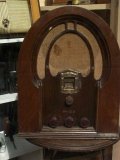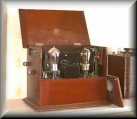AUDITIONS - short introduction
Being a PRODUCER - FIRST ROUND OF AUDITIONS - FURTHER RECALLS
| Read on to AUDITIONS 2 |
| Most of the detailed advice is in AUDITIONS 3 |
| RADIO SPOTLIGHT BOOK or AUDITIONS BOOK |
| PRE-PRODUCTION |
| Auditions are voice tests for potential actors. It's claimed that 70% of the success of a radio play is in auditioning. |
| You develop your skill as PRODUCER - the twin job you have as well as directing radio drama. |
|
The PRODUCER is responsible for the business side of radio drama production: budgets and booking the studio, auditions and casting, and making sure the actors arrive on time and with their scripts and prepared. |
| You are looking for the best radio actors. Then you are looking for the best cast - putting these actors together in a production, like the range of musical instruments in an orchestra. You go for CONTRAST. You avoid CLUSTERING (actors whose voices sound too similar.) |
| You need a range of DIALECTS. |
SPOTLIGHT BOOK - AUDITIONS BOOK
Casting - get as wide a range of possibles as possible
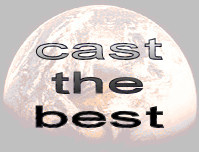
| CAM = Casting a Mate (friend) - there are good reasons to do this and sometimes bad reasons! You welcome working with someone you know and trust, and can persuade to do more time in the studio. But all that matters is the broadcast product. You have to be the best PRODUCER (business side -casting, marketing). |
| 'Your course is not a DATING AGENCY!' This is a joke - but it has a serious side - you can meet someone you find attractive - or just good to work with - in auditions. But you must cast for the best! There is no other way! |
| (STUDENTS) You are marked on the product. There is no other choice - you have to find the very best actors. |
| You have to think of the full range of actors in scenes together. You have to get these actors together in auditions - see suggestion below. You have to beware of CLUSTERING (voices which sound too like each other and are confusing for the listener). |
|
AN ECONOMICAL WAY TO SELECT FROM AUDITIONS: This is the marvellous invention of Nanette (student). Audition various actors for a 2-hander scene using the same script (a short scene). Then work on the SOUND EDITING SOFTWARE. Put the different candidates together edited in various combinations of TWO. This gives you the freedom to try out different conbinations. You are not likely to have the luxury of getting all the candidates together. |
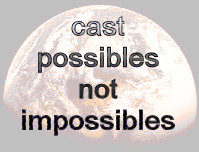
| PLEASE DO NOT GET CAUGHT IN SCRIPTING CHARACTERS AND SITUATIONS THAT YOU CANNOT CAST SUITABLY FOR. Look at who you can cast. Work this out from the first SCRIPTING DEVELOPMENT MEETINGS. |
| GETTING THE RIGHT SIZE FOR YOUR EPISODES. This is one of the most difficult requirements in scripting. If you over-write script, and / or if you record too much in production, this creates a much greater problem in post-production for you. |
| Best to sort this out as soon as possible, at the scripting stage. You have to time your scenes, and the effects and the music bridges. Read out your script for an episode and time each scene. Allow extra seconds for effects and for scene boundaries, and for the intro and extro credits. |
| Agree on the INTRO and EXTRO credits and music, as soon as you can. So that you all know what tops and tails each episode. |
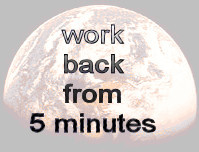
Notes from a student - about scripting and being able to cast, and post-production:
I had an interesting problem arise when I recorded a scene meant to be performed in a workshop.
Without paying particular attention to this detail, I focussed on the words in the scene, and recorded it. I then tried to post-produce it, and realised how unrealistic it sounded to have actors drilling, hammering and using power tools yet speaking to each other in their normal speaking voices.
It was such an obvious mistake that my only choice was to re-record that scene, this time having them shout the words to each other as if trying to compete with the other 'workshop noises' that are surrounding them.
This worked much better and is a mistake which in the "real
world" would have cost me in time, actor's wages and studio
space - none of which I could probably afford.
Also, at other times, I got so carried away in post production
that I ignored my script instructions for music bridges or fade
ins/outs. This only became obvious towards the end of the project
when I was trying to paste the scenes together into episodes,
and found that I had ignored the script instructions .
|
You work so much faster than stage auditions. There are particular skills you must develop in AUDITIONING. Remember that you cast from these AUDITIONS - and you also need to go out head-hunting yourself - going out there and finding - you are your own PRODUCER - go out and see plays - ask around from all directors - use your friends - network. The only danger is if you restrict yourself to your own friends. YOU ARE LOOKING FOR POTENTIAL! Most problems can be sorted out in directing - once someone has potential! |
| You have a FIRST ROUND OF AUDITIONS and a RECALL for those you are interested in, and for particular roles. And FURTHER RECALLS. |
| You have decided what scripts are your auditioning for, and you are looking for actors to fill particular roles. |
| Auditions are one of the most important skills in training as a director. Part of this is your training as a producer - that is, in the business side of directing. And especially here, in your friendly, creative and business-like relations with actors, and in the confidence you must built in your possible actors in your directing. |
| It should be quite a swift process with each auditionee at this stage. You must develop the skill to spot problems instantly. And look for potential. |
| It is best to audition people in their 'natural' accent. Best if you 'cast naturally' - that is if you are looking for a Birmingham accent, you cast someone from Birmingham. But few of us have that luxury. You note if they have other accents but deal with that at a second round of auditions, if you recall them. |
THE MICROPHONE RUTHLESSLY EXPOSES VOICE PROBLEMS AND DIALECT (ACCENT) PROBLEMS.
| Read on to AUDITIONS 2 |
| Most of the detailed advice is in AUDITIONS 3 |
| RADIO SPOTLIGHT BOOK or AUDITIONS BOOK |

To other training scripts on the site:
| Level One: Your first script: 'The Ark' production and script for seven actors and seven production team |
| Level Two: Your second Script: 'The Ouija Board' |
| Level Three: Acting : objective-choice-action |
| Acting : some key terms for the actor and director |
| Level Four: Creative scripting and production exercises -signposting, & montage, & music (and note also the hook - opening 30 seconds) |
| Level Five: How to produce a TRAIL & Some advice about radio drama directing as a student |
Level Six
|
|
|
|
| Level Seven : Script: 'We Go With' |
Level Eight
| Scripts: Dragon |
| Colourlands |
| The Egg-stremists |
| Warm Up Act |

|
|
